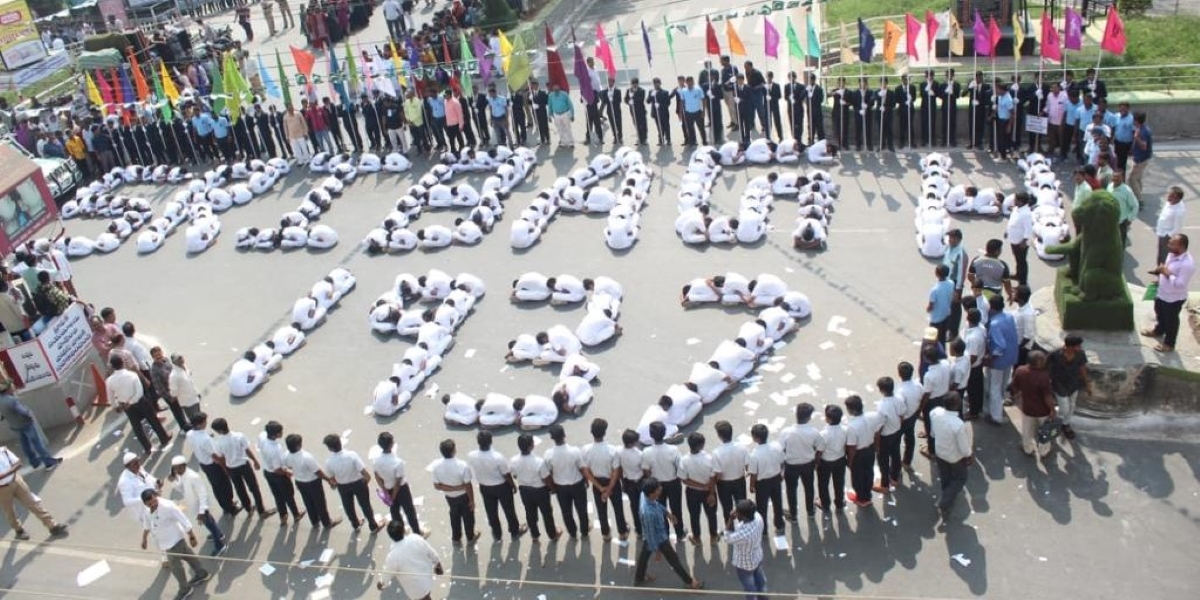Never has the ruling YSRCP pushed the Sribagh Pact anniversary on a grand scale in Rayalaseema as it did on Wednesday.

Students' formation to commemorate the Sribagh Pact in Kurnool town in Rayalaseema, Andhra, on Wednesday, 16 November, 2022. Kurnool as the judicial capital part of the Jagan government’s three capitals plan is being opposed by the TDP (Supplied)
As TDP supremo N Chandrababu Naidu reached Kurnool on Wednesday, 16 November, as part of his statewide Badude Badudu (Imposing a Burden) campaign, the town witnessed demonstrations planned by the ruling YSRCP to commemorate the 85th anniversary of the Sribagh Pact.
The attitude of the then-leaders of Andhra made the Sribagh Agreement — signed in 1937 — an important topic for the people of the Rayalaseema region, especially in terms of developmental issues.
Never has the ruling YSRCP pushed the Sribagh Pact anniversary on a grand scale in Rayalaseema as it did on Wednesday.
Chief minister YS Jagan Mohan Reddy and his Cabinet colleagues from the Rayalaseema region have been advocating that the three-capital plan that ensures decentralisation of the development in the state was inspired by the Sribagh Pact.
Kurnool as the judicial capital part of the Jagan government’s three capitals plan is being opposed by the TDP.
In support of the decentralisation that is now entangled in legal issues, the YSRCP has been aggressively campaigning in both the Rayalaseema and North Andhra regions.
Various events were held across the state throughout the day on Wednesday to highlight the essence of decentralisation, first highlighted in the Sribagh Pact on 16 November, 1937.
“Chief Minister Jagan Mohan Reddy is a firm believer in decentralisation to ensure social, regional, and economic development in all the three regions of the state. After coming to power, he stated that the dream of decentralised development would materialise only by establishing three capitals in the state i.e executive capital at Visakhapatnam, legislative capital at Amaravati and judicial capital at Kurnool,” said Rayalaseema student and youth JACs convenor Chandrappa.
“Unfortunately, N Chandrababu Naidu is opposing the judicial capital in Kurnool. Rayalaseema has been deceived all these years. At least now Jagna after he came to power in 2019 inspired by the Sribagh Pact had announced a judicial capital at Kurnool which Naidu and Jana Sena chief Pawan Kalyan are opposing,” he added.
Chandrappa, who participated in a human chain in Kurnool town, also said that Naidu, who would be in Kurnool for the next three days, should announce that he was welcoming the judicial capital at Kurnool.
On Wednesday, YSRCP MLAs and Assembly In-charges of the Kurnool, YSR Kadapa, Annamayya, Nandyala, Ananthapuramu, Tirupati, Sri Sathya Sai, Chittoor, Prakasam, and Nellore districts formed a human chain along with the public to support the idea of decentralisation. Thousands participated in the programmes on Wednesday.
In 1937, during the separate Andhra movement, political leaders from the Coastal Andhra and Rayalaseema regions came together and signed the Sribagh Pact.
The attitude of the then-leaders of Andhra made the Sribagh Agreement an important topic for the people of the Rayalaseema region, especially in terms of developmental issues.
The leaders from both areas met on 16 November, 1937, at the home of Kashinathuni Nageswara Rao, the influential publisher who established both the Andhra Patrika and the Amrutanjan.
The committee deliberated on what must happen before Rayalaseema joins the coastal districts in their push for an Andhra province.
The name “Sribagh Pact” or “Sribagh Agreement” was coined to refer to this deal.
Before the Andhra province was formed, all the regions came to this agreement so that the Rayalaseema region could catch up to the coastal areas in terms of development.

May 21, 2024

May 21, 2024

May 21, 2024

May 20, 2024

May 20, 2024

May 20, 2024